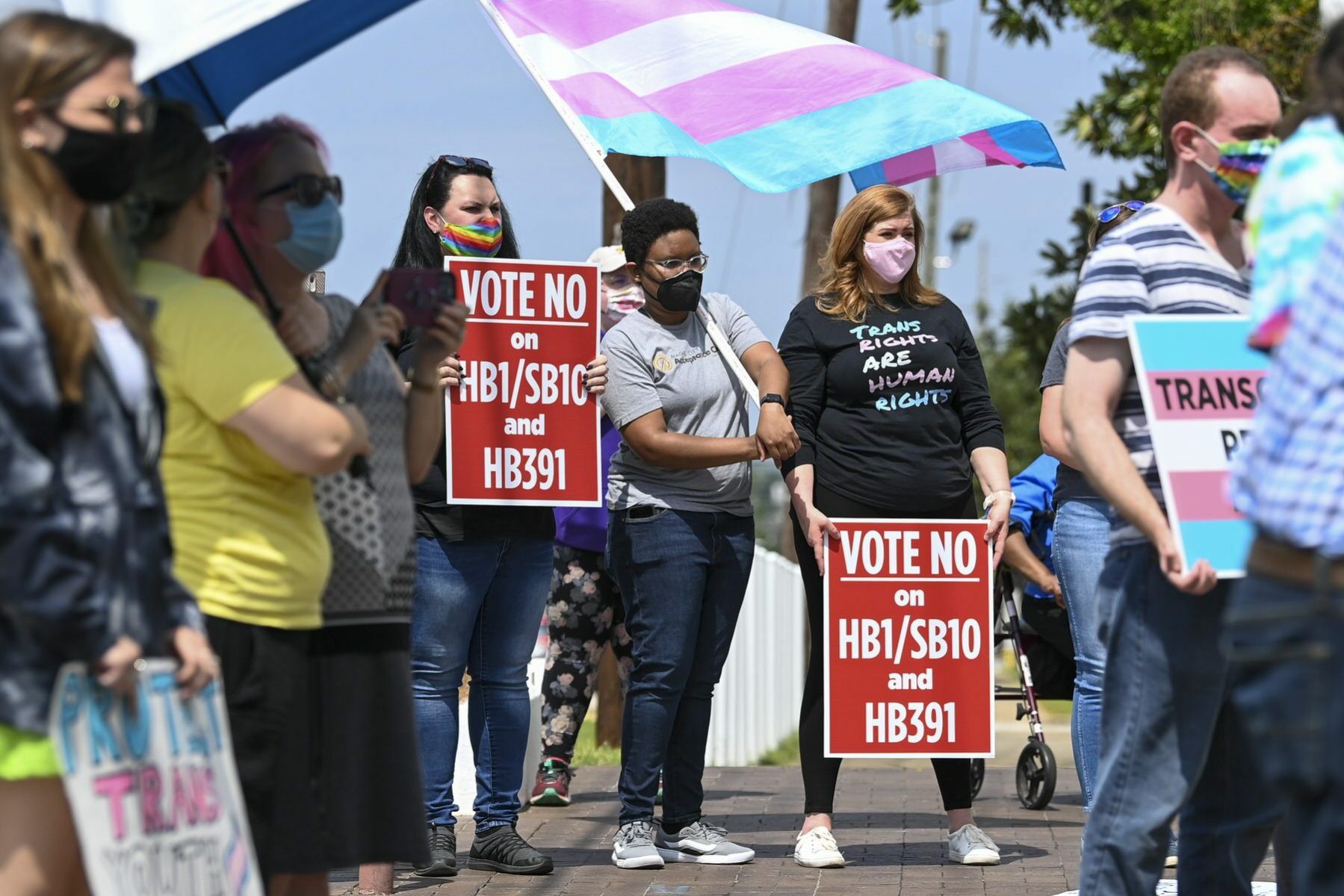At least seven states have introduced bills to regulate how textbooks and school curriculums talk about LGBTQ+ people or how teachers can discuss gender identity and sexual orientation with students.
None have become law, although some — like Florida’s bill on classroom discussion, called the “Don’t Say Gay” bill by advocates — are advancing in state legislatures, and more could be introduced as the year continues. These bills focused on schools are at the nexus of two movements: adding restrictions to LGBTQ+ youth and limiting what can be taught in schools. The fights over sex and gender are happening alongside those over teaching about bias and systemic racism.
Proponents of the curriculum bills say that they are designed to give parents a say in their kids’ schools and protect kids. But LGBTQ+ advocates say the bills, if they become law, will put already at-risk kids in more danger of mental health issues or bullying — and even put them at risk of being outed to their families.
While many of the nearly 150 anti-LGBTQ+ bills brought so far focus on restricting gender-affirming health care access and limiting transgender students’ ability to play in school sports, according to the ACLU’s count, the number of bills focused on education or curriculum restrictions is rising compared with last year.
Some measures are more severe than others: A proposed Tennessee bill would ban public school textbooks that “promote, normalize, support, or address lesbian, gay, bisexual or transgender (LGBT) issues or lifestyles.” An Oklahoma bill would require school libraries to remove books related to LGBTQ+ issues. In Arizona, another bill would require parents’ written permission for students to join any student group or club involving gender identity and sexuality.
Most prominently, in Florida a proposed bill that is moving through House committees would prohibit school districts from encouraging classroom discussions on gender identity or sexual orientation and allow parents to sue if a school violates that agreement. The companion bill passed Florida’s Senate education committee on Tuesday, and advocacy groups including Equality Florida expressed frustration that public testimony was halted early.
Republican Florida Gov. Ron DeSantis appeared to endorse the effort at a Monday press event, linking school discussions about gender identity with critical race theory, an educational framework created 40 years ago that argues the country’s legacy of racism and slavery still affects Black Americans.
“We’ve seen instances of students being told by different folks in school, ‘Oh, well, don’t worry, don’t pick your gender yet, do all this other stuff.’ They won’t tell the parents about these discussions that are happening. That is entirely inappropriate,” DeSantis said, adding that “I don’t think it’s going on in large numbers.”
The White House denounced Florida’s bill in an emailed statement on Tuesday, adding that the legislation “is not an isolated action,” as more Republican lawmakers “take actions to regulate what students can or cannot read, what they can or cannot learn, and most troubling, who they can or cannot be.”
Jeanne Nettles, who teaches 7th and 8th grade in St. Johns County, Florida, said the bill could make some of her students — such as those with two moms or two dads — feel like they need to hide parts of themselves at school.
“Are they not allowed to talk about their home life? … What are you trying to tell them by saying ‘you can’t talk about it’?” she said in an interview after the school day had ended.
She also feels it’s her responsibility as a teacher to be there for students who aren’t ready to talk to their parents about their gender identity or sexual orientation. She’s a safe adult in their lives that they can talk to, she said — and being bisexual has underscored to her the importance of being an out and visible ally for students.
Lawmakers’ heightened interest in reining in students’ exposure to LGBTQ+ issues comes during a record-setting legislative onslaught against trans youth in particular. It also follows a year during which some school districts banned Pride flags as political speech and as part of a broader push from the right to censor or ban books about race, sex and gender.
“All of those efforts are related,” said Aaron Ridings, director of public policy at the Gay, Lesbian and Straight Education Network (GLSEN). They are part of a broader political push to exclude queer youth and reduce their access to educational opportunities, he said.
“These heavy-handed mandates around parental and family involvement are really unhelpful and increase the risk of LGBTQ+ young people being outed to families and parents who may not be affirming,” Ridings said.
Family notification is the goal of several initiatives. Bills recently brought in Arizona and Alabama call for schools — or specifically teachers, counselors, and nurses — to inform parents about a student questioning their gender identity or being transgender.
While anti-LGBTQ+ curriculum bills are not new, they have not had this kind of emphasis behind them before, said Cathryn Oakley, state legislative director and senior counsel at the Human Rights Campaign. She expects to see more of them as the year progresses.
HRC is especially concerned with how the bills frame restrictions on LGBTQ+ students as supporting parents’ rights, she said — including mandating that parents should know if their child comes out at school, but not at home.
“If a kid isn’t safe coming out at home, or they’re not sure, coming out to a guidance counselor is perhaps a significantly better idea,” she said.
Austin Johnson, who teaches sociology at Kenyon College and studies LGBTQ+ health, is worried that bills focused on schools — amid other anti-trans legislation — will make the growing problem of poor mental health among LGBTQ+ youth even worse.
“It’s a perfect storm for exacerbating what’s already a growing problem,” he said. In his own research with 18- to 24-year-olds last fall, which is expected to be peer-reviewed in March, he found that most queer kids are experiencing poor mental health.
Hannah Willard, vice president of government affairs for Freedom for All Americans, said the organization is also seeing an increase in legislation impacting LGBTQ+ kids experience at school — and the overlap between anti-LGBTQ bills focused on schools and curriculums, combined with increased pressure within school districts to ban LGBTQ+ books and flags, also adds further precarity to the situation.
“There are a lot of bills that seek to ban diversity, education, inclusion and critical race theory that also seek to ban curriculum and conversations about sexual orientation and gender identity and different family structures,” she said.
South Dakota is the first state this year to sign an anti-trans bill into law — banning trans girls from playing on girls’ sports teams in schools. The White House condemned lawmakers in the state on Monday for passing the bill.
Johnson said that, if he had been able to learn about what being transgender meant in high school — especially from a teacher — that would have alleviated the despair that enveloped him; despair that he couldn’t understand or find words for on his own.
“I think it would have totally changed my life,” he said. “I think that I would have made different choices in terms of self care. … I didn’t know myself, so it was hard to care for myself.”







